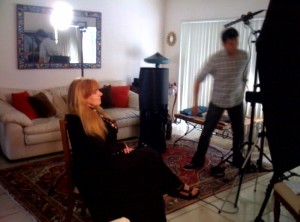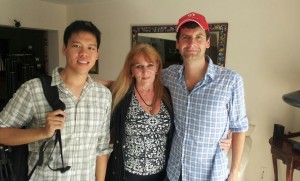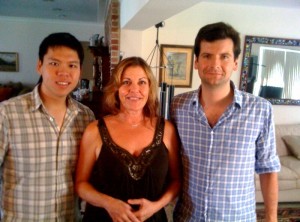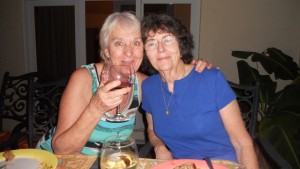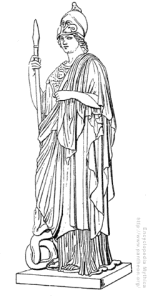Have you ever met a person who is so interesting that you had to incorporate him into a story?
We’ve just returned from a one week cruise on Allure of the Seas. My review and photos can be followed on my personal blog. It was a fabulous trip on the largest cruise ship in the world. But despite its size, we often ran into the same people.
We first saw the man at dinner. Although we had My Time Dining, we’d reserved a spot at 5:45 in the Adagio Dining Room, deck 5, each evening. My startled gaze landed on the guy as we passed him by seated at a table with a younger man.
His shoulder-length wiry black hair inevitably drew my attention. He had a black moustache to match that curved down to the edges of his mouth. His dark eyes and facial features were Asian. My imagination instantly pegged him as a karate master. Was that his young disciple with him? The younger guy had light brown hair in a short cut with sideburns and looked like some fellow you’d meet on the street in the States. A more unlikely couple couldn’t be found.
 What were they doing on a cruise together? The long-haired man looked like he’d stepped out of a movie screen. He could have played an ancient conqueror, a great warrior who’d landed incognito into our time. Or perhaps he really was a foreign film star and the young man was his manager. Then again, maybe he was a secret agent or private investigator on a case and the younger guy was his sidekick, likely a computer expert.
What were they doing on a cruise together? The long-haired man looked like he’d stepped out of a movie screen. He could have played an ancient conqueror, a great warrior who’d landed incognito into our time. Or perhaps he really was a foreign film star and the young man was his manager. Then again, maybe he was a secret agent or private investigator on a case and the younger guy was his sidekick, likely a computer expert.
 Oh, my. I could create so many stories just from this one person. This had happened to me once before on a cruise. I saw a lady with coiffed white hair and a perfectly made up face who wore elegant Parisian ensembles. She became a countess in my cruise mystery, Killer Knots. How could I use my karate master? Time will tell, but no doubt he’ll show up in one of my books. And his role will be a lot more glamorous than in real life, where he probably was on a pleasure cruise with his partner.
Oh, my. I could create so many stories just from this one person. This had happened to me once before on a cruise. I saw a lady with coiffed white hair and a perfectly made up face who wore elegant Parisian ensembles. She became a countess in my cruise mystery, Killer Knots. How could I use my karate master? Time will tell, but no doubt he’ll show up in one of my books. And his role will be a lot more glamorous than in real life, where he probably was on a pleasure cruise with his partner.
Have you ever met a character so compelling that you had to put him into a book?



